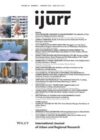This article develops the concept of a territorial business model (TBM) to renew the analysis of the production of the urban built environment beyond established urban cores. Based on the case of Chongli, a site for the 2022 Beijing Winter Olympics, this article provides a double decentering of the ways in which a mountain region was urbanized within a context of State-led financialized green entrepreneurialism. We emphasize that, as a bet on future revenues from growth and by considering extra-economic purposes, the built environment questions territorial value creation and extraction. By reflecting on the impacts of the increasing circulation of individuals’ incomes on territorial development, we posit that territorial value creation refers to a system made up of export-, visitor- and household-based flows of revenues that circulate at varied and larger scales. Simultaneously, the built environment incorporates this territorial value and is transformed into financial assets through various circuits of finance and value extraction. The TBM extends the business model concept developed by post-neoliberal/colonial scholars that calls for decentering analysis away from the dominant variegated financialization of the built environment approach that was developed from Western contexts. It further decenters the analysis by addressing urbanization processes beyond large city centers.
Details
Written by:
Thierry Theurillat, Mengke Zhang
Digital Object Identifier (DOI)
https://doi.org/10.1111/1468-2427.70036
About DOI
